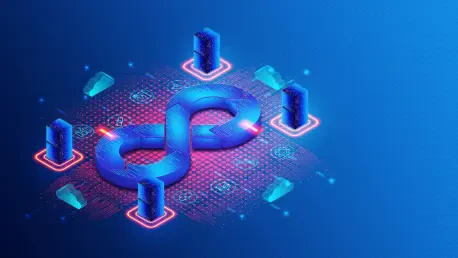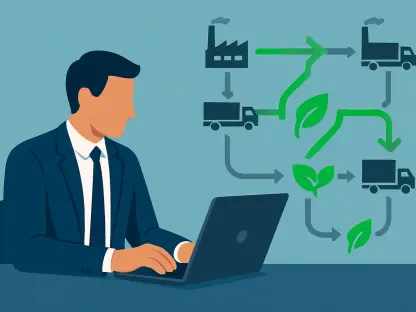In an era of rapid technological advances, security has risen to the forefront of concerns within the DevOps community. GitLab, a prominent leader in the DevSecOps landscape, recently confronted security vulnerabilities that tested its commitment to robust security measures. Between 2024 and 2025, GitLab faced notable challenges with vulnerabilities CVE-2025-25291, which involved a SAML bypass, and CVE-2025-5121, which compromised CI/CD pipelines. Despite causing short-term disruptions, these challenges have catalyzed the company’s efforts to enhance its security framework, highlighting its readiness to meet the escalating demand for AI-integrated DevOps solutions.
Strategic Response to Security Challenges
Proactive Security Measures
GitLab’s recent vulnerability challenges underscore the importance of a proactive approach to security in the evolving world of DevOps. In response, GitLab has reinforced its strategic initiatives, focusing on rapid identification and resolution of security issues to ensure minimal impact on operations. This proactive security stance aligns with GitLab’s broader “Duo strategy,” which emphasizes the expansion of premium enterprise offerings and introduces AI-driven automation tools. By enhancing its security measures, GitLab showcases not just its commitment to security but also its dedication to providing a seamless and secure user experience for developers and enterprises alike.
To achieve these goals, GitLab has integrated advanced AI capabilities into its DevSecOps framework. This includes deploying predictive analytics to monitor potential security threats and leveraging machine learning algorithms to enhance the automation of security procedures. Such measures not only address immediate vulnerabilities but also pave the way for long-term security stability. GitLab’s strategic efforts reflect a comprehensive vision that integrates cutting-edge technology with practical security solutions, thereby providing a robust defense against evolving threats in the software development lifecycle.
Emphasizing Enterprise and Compliance
GitLab’s strategic initiatives further extend to addressing the needs of regulated industries. By offering solutions such as single-tenant SaaS environments and robust compliance capabilities, GitLab aims to meet stringent industry standards while extending its enterprise reach. These solutions are integral to automating and securing CI/CD processes, crucial for maintaining system integrity and meeting compliance mandates. BofA Securities highlights GitLab’s potential to carve a niche in these sectors by delivering secure, scalable, and compliant DevOps solutions.
The integration of Anthropic’s Claude AI into its Agent Platform exemplifies GitLab’s commitment to embedding AI throughout the software development lifecycle. This incorporation enables sophisticated code suggestions and automated security audits, reinforcing GitLab’s position as a leader in AI-driven DevOps. By mitigating enterprise challenges such as tool context-switching, GitLab ensures a streamlined and efficient development process. These advancements position GitLab well to address both current and emerging security demands, fostering resilience in its operational and strategic framework.
Broader Trends and Implications
Navigating Economic and Industrial Shifts
Several macro trends shape GitLab’s trajectory, notably the growing emphasis on onshoring and compliance needs. As industries increasingly prioritize data sovereignty and localized capabilities, GitLab’s adaptability to these changing dynamics stands as a testament to its strategic acumen. This evolution is coupled with an expanding AI infrastructure, which is rapidly becoming an industry standard in addressing complex software challenges. These shifts underscore the importance of flexibility and innovation in sustaining competitive advantage.
Despite this promising outlook, GitLab is not immune to external challenges. Fiscal issues in China and varied macroeconomic concerns in different regions present a nuanced landscape for growth and stability. However, GitLab’s robust net retention rates and notable revenue growth suggest a resilience that can navigate these challenges effectively. By balancing innovation with fiscal prudence, GitLab positions itself to maintain momentum and ensure sustainable growth.
Resilience and Future Directions
GitLab’s strategic focus on enhancing its AI capabilities, alongside its pursuit of FedRAMP certification, marks a significant leap in strengthening its market presence. These initiatives not only showcase GitLab’s emphasis on security-first solutions but also highlight its commitment to pioneering advancements in the burgeoning AI infrastructure era. As AI technologies evolve, GitLab’s approach to seamlessly integrating AI into its core offerings enhances its ability to provide comprehensive solutions that address diverse industry needs.
By actively monitoring its progress and integrating feedback, GitLab remains dynamic in adapting to future challenges and opportunities. For long-term investors and stakeholders, this presents a substantial growth opportunity rooted in innovation, security, and strategic foresight. Looking ahead, GitLab’s readiness to embrace emerging technologies and market trends will likely define its standing as a leader in the AI-driven DevOps landscape.
Cultivating Long-Term Growth
In today’s fast-paced technological environment, security has become a paramount concern for the DevOps community. Within this landscape, GitLab has emerged as a prominent player in the DevSecOps field. Recently, GitLab faced significant security vulnerabilities that tested its dedication to maintaining robust security protocols. Specifically, between 2024 and 2025, the company dealt with serious vulnerabilities including CVE-2025-25291, which allowed for a SAML bypass, and CVE-2025-5121, which compromised CI/CD pipelines. Although these issues led to momentary disruptions, they ultimately fueled GitLab’s efforts to strengthen its security framework. This experience underscores GitLab’s proactive approach to addressing the escalating demand for secure, AI-powered DevOps solutions. The company is committed to adapting and enhancing its systems to align with the growing expectations of the industry, ensuring it is well-prepared to tackle emerging challenges in the realm of security and efficiency.









